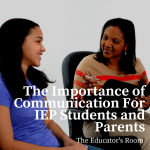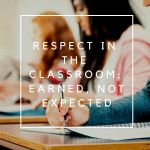The Freshman Filter
Teaching freshmen students can be a very strange challenge at times. When I started teaching, I remembered that freshman year was one of the changes. I’ll be honest; one of the things that made me want to teach middle school or freshman in high school was the way students in this age group are learning. They’re beginning to be able to share their thoughts in a more coherent way, they are starting to talk about and understand deeper concepts, and their consciences are developing in more meaningful ways. Students at this age are growing into the extraordinary young adults that they will be. It’s an exciting time in the life of a young person, and I love watching my students learn and grow over the year that they are in my class.
However, since they are learning to develop their consciences and sense of self, there are some interesting challenges that come with teaching this grade. The thing that sticks out to me is the fact that, sometimes, my students don’t have a filter. When I say filter, I mean the little voice in their head that says, to them, quietly, “Maybe I don’t want to say that?” Generally, students will say something, and immediately cover their mouths in horror when they realize what they’ve just said. Sometimes, the others students look at them with an expression of horror, and the original kid doesn’t understand why.
That’s when I step in and use my experience as a teacher. Either I pull the student aside and they explain what has happened, or I pull them aside and explain why what they said was less than ideal. This usually ends in the student being very embarrassed and apologizing because it was unintentional- as told by their face.
Why is this something that happens? There are a couple of possibilities. An article about parents helping their students survive their first year of high school suggests that it can be difficult for young students to be able to communicate what they need at times. High school is a very different place from middle school; students go from being the top of the food chain to the very bottom. They are expected to start thinking about their next steps (college or trade school or straight to the workforce). The pressure can be intense.
The Orange Incident
One day, earlier this year, I had a student bring an orange into my classroom. Being seriously allergic, I have a sign outside my door that oranges aren’t allowed. I also took a good chunk of time at the beginning of the year making sure my students knew it. Noticing the orange, I had a kid remove it, and reminded them that I was allergic.
Then, the thing that annoyed me happened. Five students in the room asked me, all at once,
“Wait, so you’re actually allergic to oranges?”
I sighed.” Yes, yes I am. Teachers don’t put signs that say “Deathly Allergic to Oranges” on their door just for giggles.” These students had a broken filter. Other students looked at them in horror. Then, we discussed just how allergic I was, putting the fear of me into the class.
Obviously, there are moments when the broken filter needs to result in something serious. A trip to an administrator, a conversation with parents, or another consequence that shows how seriously teachers take things. A lot of the time, though, it feels like a major part of my job, other than teaching my lessons and keeping my students safe, is to help my students develop that filter. How can I, as a teacher, make sure that the students in my classroom leave even more aware of the feelings of others than when they started the year?
No, I’m really asking. What do you do?
I suppose that maybe there are no easy answers to this. Maybe the best way to do that is to just help guide students in the right direction, by telling them occasionally, “Pause and think about that for just a moment.” By giving students the chance to learn from their mistakes, by working with parents and other teachers, students can grow into themselves while developing their own filters.






